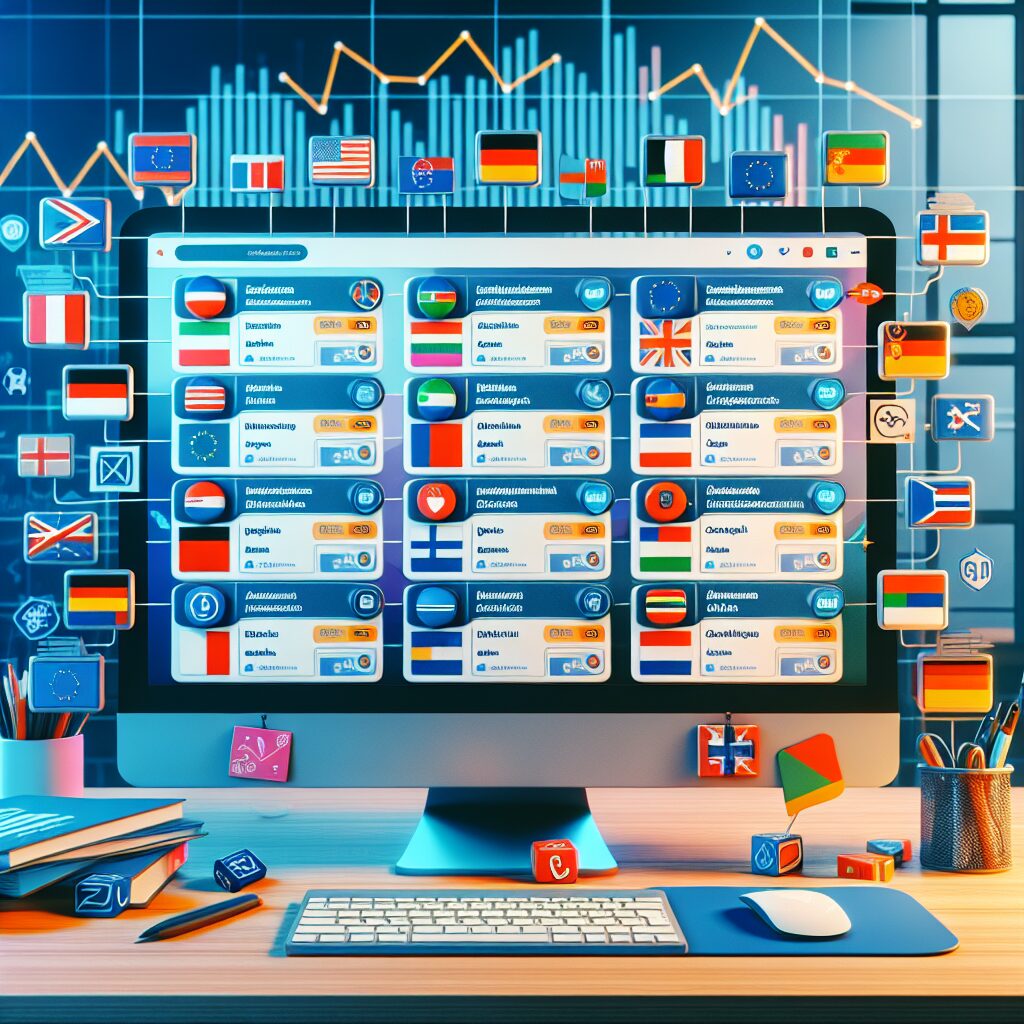About eldris
At Eldris, we automate SEO, multilingual site expansion, and EU compliance for brands scaling across Europe. Our AI-powered platform handles everything from content publishing to regulatory docs—so you don’t have to.
In This Article
- SEO automation tools are essential for scaling e-commerce globally in 2025.
- AI platforms combine content generation, SERP insights, and technical audits.
- Multilingual capabilities go beyond translation—enabling native-level content creation.
- Integrated tools streamline SEO performance, auditing, and reporting.
- Start with affordable tools and scale up as complexity demands.
- Automation boosts both efficiency and ROI across all SEO workflows.
Top SEO Automation Tools for Global E-Commerce
Industry-Leading Features in 2025
SEO automation tools have transformed how global e-commerce businesses optimise their online visibility. In 2025, these tools are not just about keyword tracking or on-page analysis—they encompass a suite of intelligent systems that analyse, act, and adapt automatically. Leading platforms like Surfer AI, AirOps, and SE Ranking now use machine learning and natural language processing (NLP) to generate content, audit technical SEO, and maintain search engine compliance across multiple languages and regions.
Modern SEO tools offer dynamic keyword clustering, content intelligence, competitive tracking, and automated schema markups. These features allow brands to localise strategies without investing excessive manual labour. Essentially, a single tool can now manage tasks that previously demanded several SEO specialists working round the clock. Learn more about Global SEO Automation and Content Solutions

Comparing Multilingual SEO Capabilities
Translation vs. Native Content Generation
One of the most significant challenges for global e-commerce brands is developing localised and culturally relevant content at scale. SEO automation tools now offer advanced multilingual SEO capabilities that distinguish between basic translation and AI-powered original content creation.
While translation platforms convert text from one language to another, they often miss cultural nuances and contextual relevance. In contrast, tools equipped with native content generation use large language models to craft new content in different languages that resonate with native speakers and adhere to local SEO best practices. This approach enhances engagement and conversion rates.
For example, platforms like AirOps integrate geolocation data and search behaviour patterns to generate regionally appropriate meta descriptions, product titles, and FAQs. Such automation ensures higher rankings on both global and local search engines, making manual localisation obsolete in many cases. Comprehensive overview of top SEO tools
“True SEO automation goes beyond translation—it builds authentic content that performs locally while scaling globally.”
AI-Powered Platforms: Surfer AI, AirOps & More
In 2025, AI-driven platforms stand at the forefront of SEO automation. Surfer AI, for example, combines real-time SERP analysis with semantic keyword integration. It doesn’t just suggest improvements—it creates fully optimised paragraphs tailored to outrank top-ranking pages. AirOps has gone further by focusing on operational SEO—providing automated workflows that conduct content gap analysis, build new plan-of-action outlines, and push updates directly to the CMS.
Other notable platforms include Jasper for AI-assisted writing, WriterZen for silos and topical authority mapping, and MarketMuse for strategic content planning. These platforms now play an instrumental role in scaling e-commerce operations, especially for businesses managing hundreds or thousands of product pages.
Moreover, the recent integration of APIs allows these tools to function seamlessly across marketing stacks, reducing friction and improving efficiency. Whether it’s updating metadata across marketplaces or spinning up blog content for seasonal campaigns, these solutions redefine speed and quality in modern SEO. Read a related article
Automation vs. Manual SEO in E-Commerce
While traditional SEO still plays a vital role in strategic decision-making, automation significantly reduces time-consuming manual tasks. Keyword research, for instance, once required hours of analysis across various platforms. Now, tools collate and interpret competitive data in minutes, offering ready-to-execute clusters and ranking difficulty metrics.
Site audits are another area where automation excels. Platforms now flag technical issues like broken links, crawling errors, and duplicated content—all in real time. More importantly, they suggest corrective measures with one-click implementation.
Manual SEO efforts are essential for campaign creativity, brand tone, and high-level strategy. However, automating routine processes improves scalability and consistency. This hybrid approach ensures that manpower is utilised where it adds the most strategic value, while automation handles precision-driven execution.
Compliance and Localization at Scale
Scaling SEO globally introduces compliance challenges across regions. Different countries impose unique regulations around data, cookies, and content accessibility. Top SEO automation tools now integrate compliance layers, ensuring content adheres to GDPR, CCPA, and accessibility standards such as WCAG 2.1.
Moreover, localisation features are more advanced. They don’t just change the language—they incorporate local spelling, pricing, units of measurement, cultural references, and local search intent. AI systems now detect these elements automatically and adapt content accordingly.
This level of contextual understanding allows e-commerce platforms to launch region-specific landing pages from a unified backend. Tools like Weglot and Transifex connect SEO performance with localisation accuracy, ensuring brands maintain a consistent voice while respecting cultural expectations everywhere.
Integration with Leading E-Commerce Platforms
Effective SEO automation tools must seamlessly integrate with top e-commerce platforms like Shopify, Magento, WooCommerce, and BigCommerce. These integrations enable dynamic updates, synchronised metadata, and enhanced inventory visibility—all tailored to optimise for search.
For instance, Surfer’s plug-in for Shopify lets users analyse content directly within the product editor. Similarly, AirOps provides prebuilt connectors for pushing SEO recommendations into site architecture automatically.
APIs further improve this connectivity, enabling real-time communication between SEO platforms, CRM systems, and analytics dashboards. With such integration, businesses can unify their marketing workflows, reduce operational silos, and respond faster to competitive shifts.
Case Studies: Global Stores Automating SEO
Numerous brands are already leveraging SEO automation tools successfully. A leading electronics retailer in the UK used Jasper integrated with Surfer AI to automate blog content creation around seasonal product launches. They recorded a 41% increase in organic traffic within three months.
Meanwhile, a global fashion outlet upgraded to a localisation-based automation system using Transifex and AirOps. The brand was able to deploy localised product pages for France, Germany, and Japan in under four weeks—a task that previously took three months. As a result, regional conversion rates improved by nearly 30%.
These case studies highlight how businesses—large or small—can reduce manual workload, increase time-to-market, and drive measurable business outcomes through SEO automation tools.
Cost-Effective Tools for Small Businesses
While enterprise-level platforms offer comprehensive features, several cost-effective SEO tools are tailored for SMEs. Solutions like SE Ranking, Screaming Frog, and RankMath provide robust automation without the hefty price tag.
SE Ranking offers all-in-one capabilities such as backlink monitoring, website audits, and automatic reporting. Screaming Frog’s crawler is highly capable of identifying technical SEO issues in real time. RankMath, a WordPress plugin, includes keyword optimisation, schema generation, and content scoring integrated into the CMS—ideal for startups and sole traders.
These tools demonstrate that budget is no longer a barrier to advanced SEO capabilities. With thoughtful planning and the right automation stack, even small businesses can compete on a global scale.
Tools That Optimize SEO Performance Metrics
Modern SEO automation tools impact more than content creation—they enhance performance metrics across the board. Bounce rate, average dwell time, click-through rate (CTR), and keyword rankings are now directly influenced by how well a page is structured and updated using automation.
Platforms use predictive AI to determine the best time to update content, which pages need internal linking, and even when to republish material to re-engage search engine crawlers. These data-driven insights convert into better rankings and higher user engagement.
Additionally, automated reporting dashboards consolidate all metrics into actionable intelligence. Not only does this enable swift decision-making, but it also holds teams accountable to continuous SEO improvements.
Tips for Implementing SEO Automation Today
For those considering SEO automation, here are several best practices to guide successful implementation:
- Start with a clear SEO strategy and define your goals—traffic, conversions, rankings, or localisation.
- Choose tools that integrate with your current tech stack—especially your CMS and e-commerce platform.
- Leverage trial periods to test functionalities before committing to paid plans.
- Automate high-volume tasks first—metadata generation, site audits, and update scheduling.
- Combine automation with manual oversight to maintain brand consistency and alignment.
- Regularly review automation outputs for accuracy, especially in multilingual content streams.
By following these steps, businesses can begin to reap automation benefits without compromising quality or control.
Conclusion: Future-Proofing SEO Through Automation
[CONCLUSION_CONTENT]
Great guide on seo-content-automation-tool-reviews-global-stores – Community Feedback
What is the best SEO content automation tool for global e-commerce?
The top SEO content automation tools for global e-commerce are those with strong multilingual and automation features, like Surfer AI, AirOps, and Adaptify. Each offers scalable content creation and optimisation, making them ideal for online stores expanding internationally.
How does content automation support international SEO?
Content automation streamlines multilingual content creation, optimises on-page SEO meta-data, and ensures consistent site structure at scale. This enables global brands to launch and manage optimised content quickly for various markets, boosting rankings and organic traffic.
Are AI-powered SEO automation tools reliable for compliance?
Yes, modern AI-powered SEO automation tools often include features for regulatory compliance, ensuring content meets local laws and language standards. However, brands should verify that their solution supports local compliance documentation and automated checks.








